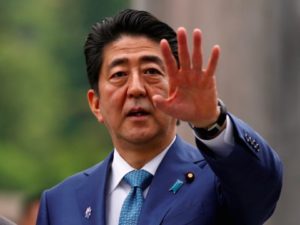
By Sunya Hassan || Staff Writer
On September 25th, Prime Minister Shinzo Abe announced plans for a snap election. The results of said election were announced on October 22nd. They were unsurprising, but the aftermath may result in a change of Japanese military policies.
Initially, the country wasn’t supposed to hold another parliamentary election until the end of 2018. So why did Prime Minister Shinzo Abe call for an early election? Purportedly, it had to do with addressing the country’s economic policy. However, experts almost unanimously agree that it was a tactical decision on Abe’s part. Earlier this year, two corruption scandals that implicated both his wife and several members of his parliament marred his historically high approval ratings. According to the Sasakawa Peace Foundation USA, on August 1st, 60% of Japanese voters disapproved of Abe’s performance, while 32% approved. His numbers had improved since then, but calling for an early parliamentary election served as an opportunity to crush any opposition towards him or his party. He argued that Japan needed a strong and stabilized government in order to address times of domestic and international uncertainty, referring to the looming threat of North Korea. It was a gamble.
The gamble paid off, as Shinzo Abe remains Japan’s prime minister. The victory virtually assured him of retaining leadership of his party for another three years and also makes him the longest-serving prime minister in Japanese history. According to exit polls, his hard line against North Korea’s missile and nuclear program helped him crush opposition parties. He has secured a strong mandate for it. Overall, his success in this recent election is mainly in regards to his uncompromising stance on the threat North Korea poses. Support for this rose after the regime’s launch of two ballistic missiles over the island of Hokkaido and the threat to “sink” Japan.
The snap election also opened the possibility of Japan’s post World War II commitment to pacifism eroding. Abe, a nationalist by Japanese standards, has long been urging for Japan to build up its military and prepare to use offensive force if necessary.
His success in this recent election allows him to keep pushing. Prior to the election, Daniel Smith, a political scientist at Harvard who studies Japanese politics stated, “Abe will try to push for a constitutional revision while he still can. If he does poorly [in the election], it’s probably back off the table.” As expected, Abe’s victory succeeded in gaining room to push for a revision of Japan’s pacifist constitution, specifically the restriction on its military to a defensive role.
The impact of this would resonate beyond Japan. China, especially, has shown deep concern about the possibility of a fully militarized Japan. There are many in both China and South Korea that still harbor bitter memories of Japanese militarism during the World Wars. They’d see any move towards it as a threat to their security. Most Japanese voters are opposed to the revision anyhow. Liberals in Japan, especially, fear that normalizing the nation’s armed forces will lead to pressured involvement in US-lead wars. To make any changes to the constitution, Abe would require a supermajority. In other words, a two-thirds majority in both houses of the Japanese Diet and a simple majority in a national referendum. The outcome is unlikely, but not impossible.
First-year Sunya Hassan is a staff writer. Her email is shassan@fandm.edu.